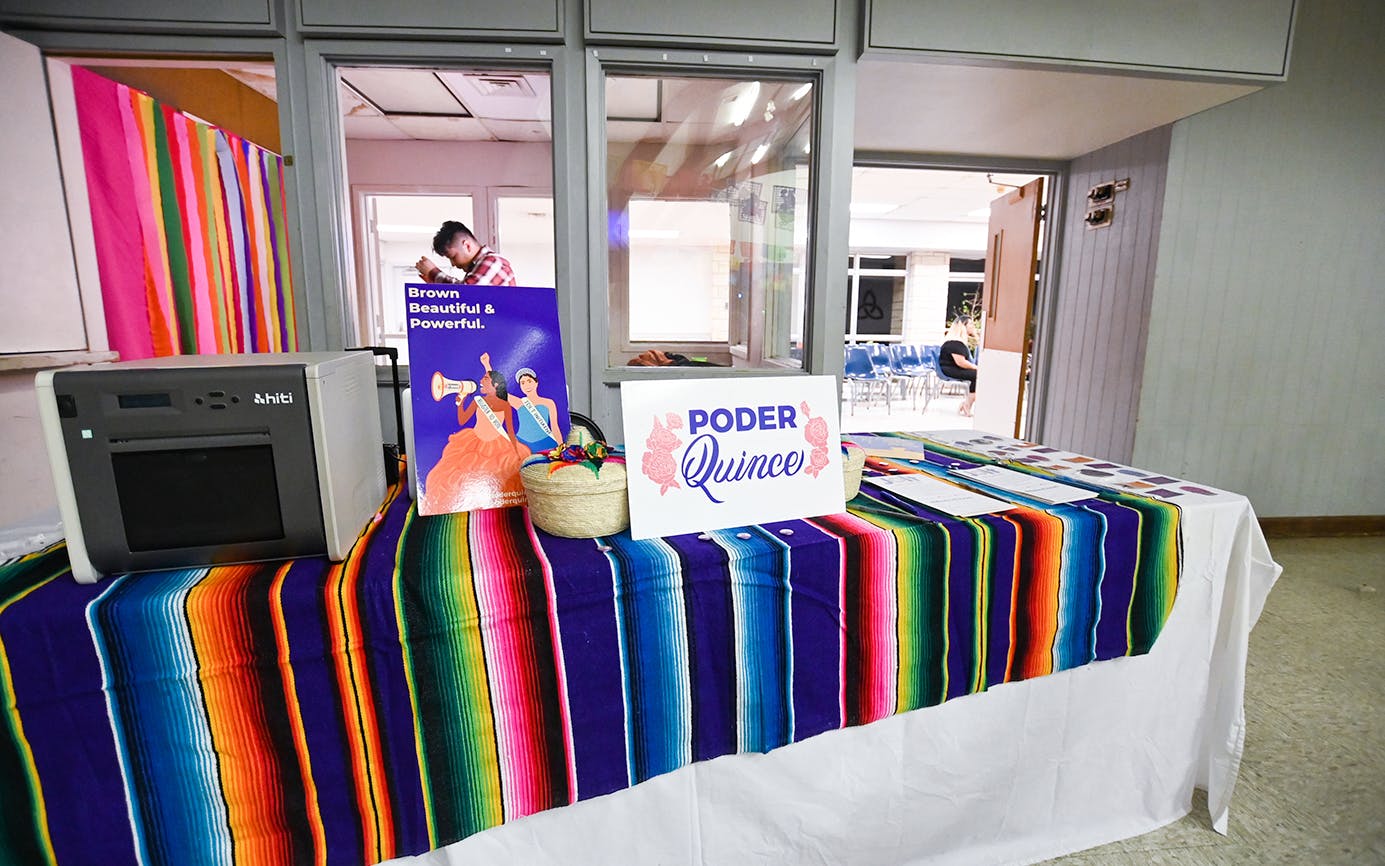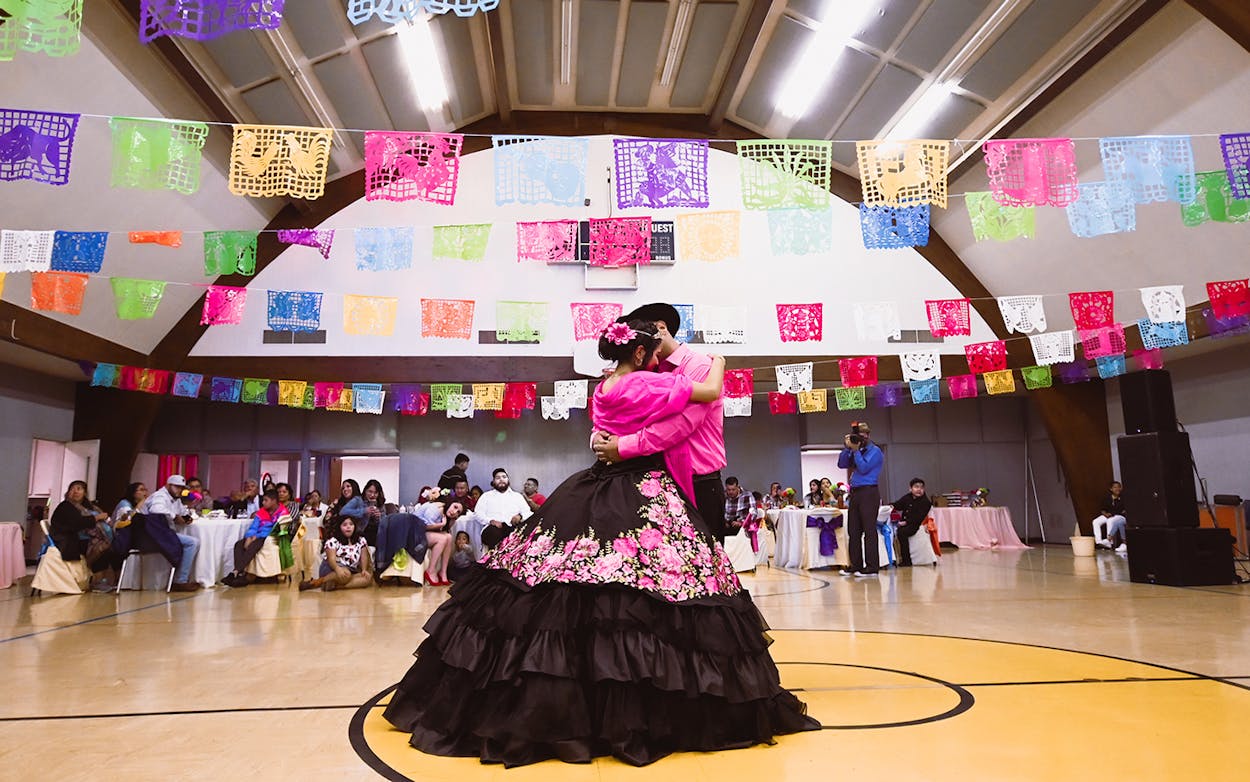On a recent Saturday night in southeast Dallas, the savory smell of arroz rojo and beef fajitas drifted through the swinging doors of the community center kitchen at the Pleasant Grove Christian Church. There, members of the Alvarez and Lucas families made their way to their respective seats, with dinner and plastic cups full of agua de melón in tow. Meanwhile, their children ran toward a table overflowing with tamarindo treats, de la Rosa mazapán, and chile watermelon candies.
Maya Alvarez, 15, glided from table to table, clad in a black ball gown embroidered with flowers. A bright pink shawl, which matched the floral stitching on her dress, rested on her arms. She mingled with relatives until her cousin Josue Lucas—the choreographer for the night—cued her with a signal. Alvarez suddenly dashed out into the hallway; her quinceañera was about to begin.
The centuries-old Latin American celebration honors a young girl’s entrance into womanhood. But as times have changed, so has tradition. In the past, quinceañeras would often mark the first time the birthday girl put on makeup or wore high heels. Typically her dress would be white, to symbolize purity and new beginnings.
These days many young Latinxs have chosen to sport trendier dresses rather than ball gowns, combine quince traditions with a sweet sixteen party, or even go on a quince cruise. For Alvarez, that meant opting for cowboy boots instead of high heels, and inviting a voter registration team to join her on her special day.
Earlier this year, the progressive political organization Jolt, which has 22 chapters in major cities and universities throughout Texas, rolled out their Poder Quince/Quince Power program—one of several initiatives aimed at mobilizing the Latinx vote in the Lone Star State. By Jolt’s estimate, roughly 50,000 quinceañeras are celebrated across Texas each year, with each one bringing together anywhere from dozens to hundreds of guests who could be potential first-time voters. In exchange for partnering with Jolt, participating quinceañeras receive a free photobooth and a “Poder Quince” Snapchat filter for their big day.

Since launching in May 2019, the organization has teamed up with thirty quinces, including Alvarez’s. By reaching out to local choreographers, event planners, and dress shops in the Houston, Austin, and Dallas areas, they’ve become increasingly connected with interested young Latinx families gearing up to celebrate quinces. Jolt staff sets up a table at each event where they answer questions, register guests, and sign them up to receive reminders on when to vote.
“A lot of people dismiss fifteen-year-old girls, but they know what’s going on,” says Carmen Ayala, Jolt’s culture and events manager. “They see what’s happening on Twitter, they hear the president when he talks about their community. They want to be involved.”
For Alvarez, the decision to partner with Jolt was an emotional one. Nine years ago, a late-night knock at the door from Immigration and Customs Enforcement officers at her cousin’s house resulted in her aunt and uncle, Raul and Angélica Lucas, being deported to León, Guanajuato, Mexico. They were local pastors who everyone relied on in times of struggle or conflict, and their sudden deportation left the whole family on edge.
“We didn’t know who was next, or why it had to be this way,” Josue Lucas says. “We were asking ourselves, ‘Where is God now?'”
At her quince, Alvarez reentered the reception hall on the arms of her parents for her formal presentation. They led a beaming Alvarez to a white chair in the center of the room, then held her in a tight embrace as she fought back tears. They left, and one by one, Alvarez’s madrinas—relatives and family friends who take on the role of godparents, by sponsoring some of the gifts given to the quinceañera—made their way up with aretes (earrings), a cadena (necklace), and zapatos (shoes). Crucially, this part of the celebration allows the family to participate in Alvarez’s transition into adulthood, and her aunt and uncle’s absence there felt particularly noticeable.
Following the presentation of gifts, Alvarez joined her court of honor (a role often given to friends and cousins) along with her boyfriend, Juan, in a traditional quinceañera waltz. Later, Alvarez joined her mother, Linda, in addressing the crowd. “It’s really important to get out there and vote,” Alvarez said. “But even if you can’t, motivate the other people in this room who can to help the Hispanic community and get out there.”
In Spanish, her mother continued: “Voting is the only way our voices can be heard. We’re in a time where our community is being mistreated, so if you can register, that vote will count not just for you, but for a lot of people in our community who can’t.”
With that, the band took the stage as a dozen guests gathered at the voter registration table. A few people had already registered to vote, but signed up for early voting reminders. Others asked specific questions that would help them register, such as if they needed to update their address. This is just step one, says Ayala. After this, the Jolt team will head to Alvarez’s high school to help eligible seniors with voter registration.
The Latinx community is expected to play a critical role in the upcoming 2020 presidential election. Much of this attention is currently focused on Texas, where 30 percent of the eligible voter population is Latinx (the third-highest in the country). According to the Pew Research Center, the pool of eligible Latinx voters has largely been driven by “young U.S.-born Hispanics coming of age.” “People are counting on us not to vote,” Ayala says. “We have a lot of power here.”
- More About:
- Politics & Policy








